This is the final part of Balladeer’s Blog’s look at the swashbuckling legends that surround Francois Villon (1431-1463?), remembered as one of France’s greatest poets and a notorious outlaw.
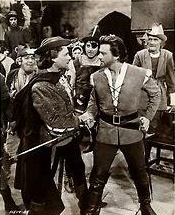 FRANCOIS VILLON PART SEVEN – We pick up this time in 1460, as Villon’s roaming career as a highwayman and armed burglar among the Coquillards was fast approaching its end, though the poet seems not to have realized it. None of his poetry from 1458 and 1459 has survived, unfortunately.
FRANCOIS VILLON PART SEVEN – We pick up this time in 1460, as Villon’s roaming career as a highwayman and armed burglar among the Coquillards was fast approaching its end, though the poet seems not to have realized it. None of his poetry from 1458 and 1459 has survived, unfortunately.
Accounts vary wildly, but Francois and some of his outlaw colleagues had supposedly been taking advantage of the feud between Archbishop Thibaud d’Aussigny of Orleans and his subordinate clergy members. Prior to Villon’s fugitive status, the Archbishop might have been a figure who appealed to him. D’Aussigny was a genuine reformer whose appointment was opposed by the Pope and the King, but whose political allies had maneuvered him into position despite all that.
Thibaud sought to rehabilitate the image of the clergy, which, as our previous installments have shown, were often gaudily living like sleazy televangelists of later centuries. Many flaunted worldly wealth and openly consorted with their mistresses.
The Archbishop forbade priests and monks from wearing jewels and fancy clothing. He also ruled that they stop eating and drinking gluttonously off church funds. Any clergymen caught violating these edicts had their pay cut by the determined d’Aussigny, who became hated by the lecherous, larcenous “holy men” under him.
With such policies in place, Villon and other Coquillards saw the time was ripe to plunder some of that wealth that had become so publicly controversial. Ultimately, Francois was among the thieves arrested for the spectacular theft of a silver chalice and more from an Orleans church.
 Archbishop d’Aussigny personally saw to it that Villon, infamous for his scandalous poetry and his outlaw status, was tortured to try getting him to confess to other crimes. Some of the priests feuding with the Archbishop had paid Coquillards to burn out d’Aussigny’s vineyards, and supposedly Thibaud had convinced himself that Francois had been among them. Other accounts claim he was just making a public example of Villon due to his notoriety.
Archbishop d’Aussigny personally saw to it that Villon, infamous for his scandalous poetry and his outlaw status, was tortured to try getting him to confess to other crimes. Some of the priests feuding with the Archbishop had paid Coquillards to burn out d’Aussigny’s vineyards, and supposedly Thibaud had convinced himself that Francois had been among them. Other accounts claim he was just making a public example of Villon due to his notoriety.
After the torture produced no results, d’Aussigny had Francois imprisoned in the dungeon of the Tower of Manasses in Meung. This prison had a harsh, well-earned reputation for severity. Villon was in one of the lowest cells, infested with pests and overrun by rats.
The only entrance to our man’s cell was the trapdoor in the ceiling, through which bread and water was lowered to him at irregular intervals. Already in weakened condition from the torture that he had suffered, Villon contracted tuberculosis in the Meung dungeon.
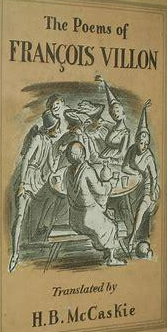 As the months rolled by, Francois managed to charm a guard or two into providing him with paper, pen and ink with which to write. He wrote a poem in ballade form describing conditions at Meung and managed to get it smuggled to the outside world.
As the months rolled by, Francois managed to charm a guard or two into providing him with paper, pen and ink with which to write. He wrote a poem in ballade form describing conditions at Meung and managed to get it smuggled to the outside world.
This poem, known as Far from the Festival of May and other titles, has survived, but it failed to rouse sufficient sympathy for our man’s plight to get him released or transferred to a better prison.
Villon would likely have died in that dungeon, but fate intervened. In October of 1461, King Louis the Eleventh, freshly coronated in July, was traveling through Meung. As he had done in every town and city along his route, Louis ordered the release of all prisoners, and Francois was among them.
Once free, the poet churned out some verse damning Archbishop d’Aussigny and praising Louis the Eleventh. Among the latter were lines praying that “God will give Louis the honor and glory of Solomon.”
Villon’s health would never fully return. His lung issues worsened, the malnutrition he had suffered in Meung caused lingering problems and his arms and legs were never the same after the torture he had been subjected to.
Francois’ eyebrows had been scraped off and his hair repeatedly shaven from lice he picked up in the dungeon. In one of his poems from this period he made dark jokes at his own expense, saying he now “looked like a turnip.”
 No more highwayman antics for Villon. No more daring raids on well-heeled establishments to plunder valuables. No more swashbuckling nights blowing his money on “taverns and saucy tarts.”
No more highwayman antics for Villon. No more daring raids on well-heeled establishments to plunder valuables. No more swashbuckling nights blowing his money on “taverns and saucy tarts.”
Limply, Francois made his way southwest to Poitou, following the River Vienne. It was there that the poet was temporarily taken care of by a pair of young female “fans” of his work. Villon made no insinuations that it was sexual, and given his ravaged physical condition at the time he was far from the robust woman-chaser of the past.
After learning the Poitevin dialect of the region from those ladies, our man journeyed on. There is speculation that while he was in the area, Villon had visited the city of Poitiers to take in the Church of Saint Porchaire and the nearby house where his idol Joan of Arc had been questioned by religious and secular authorities before being allowed to command the royal army.
Obtaining funds from sympathetic parties in Moulins, Francois returned to his beloved Paris for the first time since fleeing the city following the College of Navarre caper in 1456. It was now December, 1461.
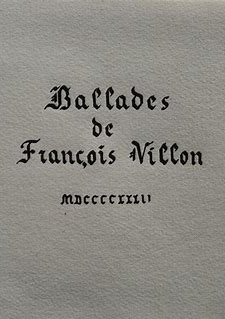 In a dingy rented room, Villon spent the winter of 1461 into 1462 and much of the spring recuperating from his ordeal and composing some of his greatest poetry, including his magnum opus – Le Grand Testament.
In a dingy rented room, Villon spent the winter of 1461 into 1462 and much of the spring recuperating from his ordeal and composing some of his greatest poetry, including his magnum opus – Le Grand Testament.
It would be unbearable to think of Francois Villon’s oeuvre without works like Debate between the Heart and the Body, Ballade to His Beloved, Ballade pour Prier Notre Dame and Les Regrets de la Belle Heaulmiere, the former Queen of Paris Prostitutes whose age had finally caught up with her.
December of 1461 through May of 1462 also saw Villon write poems in the form of dirges for two of his former outlaw colleagues – Colin de Cayeux and Rene de Montigny – who had been hanged during his absence. In addition, Francois wrote poems of goodbye regarding two lost loves in Paris – one of them a woman named Marthe or Rose (accounts vary), who refused to have anything more to do with the infamous outlaw and iconoclastic poet.
The second of the two was never named by Villon, at least not in his surviving works, but his poem states she had passed away while he was absent from Paris. Our man’s output over the course of his six-month recovery distilled elements of his entire life with greater poignancy than ever.
His poems about Paris’ criminal underworld by themselves were part opera and part Gutter Theatrical. They presented an outlaw tableau beyond anything that Bertholt Brecht ever gave the world. Villon’s verse dwelling on the specter of the gallows hanging over him and his criminal colleagues reflected his more melancholy state of mind following his torture and imprisonment.
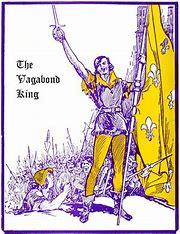 And let’s face it, Le Grand Testament should have been adapted as a stage musical about Villon’s life. Instead, we got the history-mangling messes called If I Were King and The Vagabond King.
And let’s face it, Le Grand Testament should have been adapted as a stage musical about Villon’s life. Instead, we got the history-mangling messes called If I Were King and The Vagabond King.
At any rate, with masterpieces like But Where are the Snows of Yesteryear now put down in writing, Francois put aside his pen and paper for a time. Now that his health had returned as much as it was ever going to, June saw the poet return to his favorite tavern the Pomme de Pin (Pine Comb). Needless to say, this led to renewed involvement with the criminal element and a return to rowdy partying.
Villon succumbed to his old habits. Though details are missing regarding his activities from June through October, it is known that Francois was back in jail for theft on November 3rd, 1462. Prosecution for that crime failed, but the years-old charges against him for the College of Navarre job were called up by Villon’s old foe Laurence Poutrel.
Our man managed to pay the fine of fifty gold pieces and was released November 7th. The night of December 7th found Villon and a few cohorts implicated in a break-in and violence. Conflicting accounts of the crime have survived, many of them hazy, but this time the law came down hard and Francois was sentenced to hang.
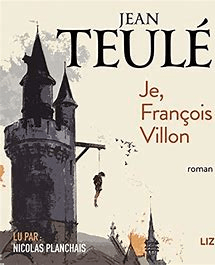 While awaiting execution, Villon wrote his final noteworthy poem – Ballad of the Hanged. This work cemented the poet’s place in outlaw legends and is among the most quoted of Villon’s works. As always, Francois’ celebrity attracted a lot of attention, and on January 5th, 1463 the High Court overturned the sentence of hanging and replaced it with banishment.
While awaiting execution, Villon wrote his final noteworthy poem – Ballad of the Hanged. This work cemented the poet’s place in outlaw legends and is among the most quoted of Villon’s works. As always, Francois’ celebrity attracted a lot of attention, and on January 5th, 1463 the High Court overturned the sentence of hanging and replaced it with banishment.
In Villon’s case this meant a slow death instead of the comparative swiftness of the gallows. Under banishment he was not eligible for sanctuary in any church, and he was “untouchable” even by his former criminal allies.
On January 8th, Francois Villon left his beloved Paris for the last time. No verified accounts of his subsequent activities are known to us. Given his lingering health problems from the dungeon of Meung it is possible he did not even survive the winter.
Friends of the poet gave up all hope that he was still alive in 1467, when King Louis the Eleventh offered a general amnesty for all those banished from Paris. No one who knew Villon doubted that he would have returned to his adored city if he survived.
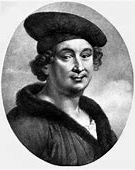 EPILOGUE – Legends and folklore claiming that Villon lived on into the 1480s proliferated in the decades and centuries ahead. Here in the modern era, Goth writers have even written stories that Francois had been bitten by a vampire and became one of the undead himself.
EPILOGUE – Legends and folklore claiming that Villon lived on into the 1480s proliferated in the decades and centuries ahead. Here in the modern era, Goth writers have even written stories that Francois had been bitten by a vampire and became one of the undead himself.
 Appreciation for Villon’s literary legacy has grown immeasurably and has influenced generations of artists to this very day. Often called the poet of rebels, outlaws and the oppressed, Villon’s moving depiction of the suffering endured by the underclasses at the hands of uncaring royalty and corrupt religious leaders has been called “keening for the living.”
Appreciation for Villon’s literary legacy has grown immeasurably and has influenced generations of artists to this very day. Often called the poet of rebels, outlaws and the oppressed, Villon’s moving depiction of the suffering endured by the underclasses at the hands of uncaring royalty and corrupt religious leaders has been called “keening for the living.”
The first supposedly “complete” collection of Villon’s surviving poetry was printed in Paris in 1489. During 1533 the poet Clement Marot edited a volume of Francois’ work which eliminated some poems which Clement had arbitrarily decided were not actually written by Villon. Others disagree and there is still debate about “authentic” and “inauthentic” Villon poems.
Sadly, the ravages of time had already caused the loss of much of Francois Villon’s output by the time that first 1489 edition saw print. Along with arguments over “canonical” works of the man there is the greater tragedy that so much has been lost forever.

Beautiful post on Francois Villon ! A great poet with tragic life! Well shared.🤞🤞
Thank you very much!
💐
You’re the best!
Only you know that 😄😄😄 believe me no one knows even not me also 😔😔
Ha! You are so eccentric!
😁
😀 😀